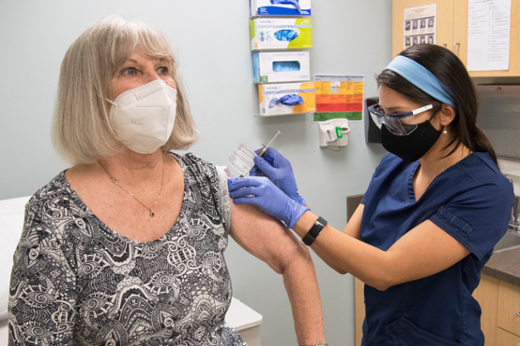A Phase 1 trial of an investigational mRNA vaccine to prevent SARS-CoV-2 infection has shown that the vaccine is well tolerated and generates a strong immune response in older adults. A report published today in The New England Journal of Medicine (NEJM) describes the findings from the study, which was supported by the National Institute of Allergy and Infectious Diseases (NIAID). SARS-CoV-2 is the virus that causes COVID-19 disease.
Emory University was one of three sites in the nation to enroll adults ages 56 and older as part of the Phase 1 trial. Emory is one of the NIAID Vaccine Treatment and Evaluation Units, part of the NIAID-funded Infectious Diseases Clinical Research Consortium (IDCRC). The lead authors on the new NEJM report are Evan Anderson, MD, and Nadine Rouphael, MD, principal investigators for the mRNA-1273 vaccine trial at Emory.
The experimental vaccine was co-developed by researchers at NIAID and Moderna, Inc. of Cambridge, Massachusetts. The Phase 1 trial began on March 16, 2020, and was expanded to enroll older adults about one month later. Older adults are more vulnerable to complications of COVID-19 and are an important population for vaccination.
In addition to Emory, the trial was conducted at Kaiser Permanente Washington Health Research Institute (KPWHRI) in Seattle and NIAID’s Vaccine Research Center (VRC) clinic at the NIH Clinical Center in Bethesda, Maryland. The Coalition for Epidemic Preparedness Innovations (CEPI) supported the manufacturing of the vaccine candidate for this trial. The IDCRC, based at Emory, analyzed samples for the trial.
In its expansion to include older adults, the trial enrolled 40 healthy volunteers: 20 adults ages 56 to 70 years, and 20 adults ages 71 years and older. Ten volunteers in each age group received a lower dose of the vaccine (25 µg), and 10 volunteers in each age group received a higher dose (100 µg). After approximately one month, volunteers then received a second dose of the same vaccine at the same dosage. Throughout the study, volunteers attended clinic visits to have their immune responses to the vaccine and safety assessed.
Overall, the researchers found that the investigational vaccine was well-tolerated in this older age group. Although some volunteers experienced some transient adverse effects, including fever and fatigue after vaccination, the researchers found that they also exhibited a good immune response to the vaccine. The blood of vaccinated volunteers contained robust binding and neutralizing antibodies against SARS-CoV-2. Importantly, the immune response to the vaccine seen in older volunteers was comparable to that seen in younger age groups.
“These results are very encouraging,” says Anderson, professor of medicine and pediatrics at Emory University School of Medicine and a pediatrician at Children’s Healthcare of Atlanta. “Understanding how the vaccine impacts older adults is an important part of measuring its safety and efficacy, especially as we move forward into the much larger Phase 3 study.”
“Older adults have been hit hard by COVID-19,” says Rouphael, interim director of the Hope Clinic of the Emory Vaccine Center and professor of medicine at Emory University School of Medicine. “They are more likely to experience complications and to require hospitalization. It’s critical that they be a part of any vaccination campaign and have confidence that the vaccine is safe and effective.”
The study will continue to follow the older volunteers for approximately a year after the second vaccination to monitor the long-term effects of the vaccine. According to the researchers, these Phase 1 trial results further support testing of the investigational vaccine in older adults in an ongoing large Phase 3 trial.
Emory has enrolled hundreds of adults in the Phase 3 trial at three Atlanta clinics: The Hope Clinic, the ECC-Vaccine Research Clinic and the Grady Clinic.
For more details on the Phase 1 trial, please see NIAID’s March 16 press release, NIAID’s March 27 statement, or visit ClinicalTrials.gov and search identifier NCT04283461.
ARTICLE:
Anderson et al. Safety and Immunogenicity of SARS-CoV-2 mRNA-1273 Vaccine in Older Adults - Preliminary Report. The New England Journal of Medicine. DOI: TKTKTK (2020).
About the Infectious Diseases Clinical Research Consortium (IDCRC):
The IDCRC supports this trial through NIAID (UM1AI148684). The IDCRC, consisting of the Vaccine Treatment and Evaluation Units (VTEUs) and the IDCRC Leadership Group, was formed in 2019 to support the planning and implementation of infectious diseases clinical research that efficiently addresses the scientific priorities of NIAID. The consortium includes infectious diseases leaders and clinical researchers from Emory University, University of Maryland School of Medicine, Baylor College of Medicine, Cincinnati Children’s Medical Center and University of Cincinnati, FHI360, Fred Hutchinson Cancer Research Center, Johns Hopkins University, Kaiser Permanente Washington Health Research Institute, New York University, Saint Louis University, Vanderbilt University Medical Center, University of Alabama at Birmingham, University of Rochester, and University of Washington.

